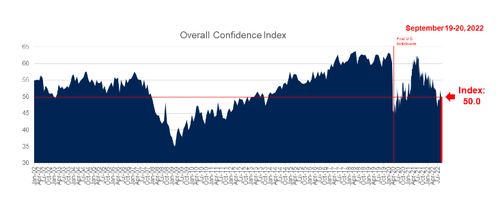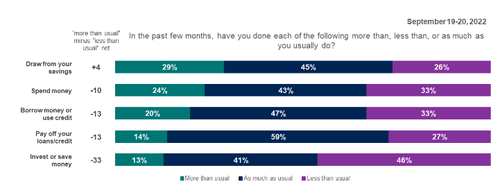
New data out last week in the latest Forbes Advisor-Ipsos Consumer Confidence Weekly Tracker had shed some light on just how much Americans have been dipping into their savings as economic conditions worsen in the country.
While the survey showed that economic sentiment amongst Americans is unchanged, it still sits at levels that are "significantly lower than it did to start the year", the report says.
While some indices contained in the survey pertaining to investments, expectations and jobs remain relatively stable (expectations declined slightly), it's of note that the survey showed "a significant increase in the number of Americans who are withdrawing from their savings more than usual and investing or saving money less than usual."
Overall confidence still remains 3.4 points below the pandemic average, the report showed.
The expectations sub-index, mentioned above, is down 0.7 points from two weeks ago and sitting "below its pandemic and historical averages, as well as its pre-pandemic reading".
The report also notes that "for the third time in four months, the amount that draw from their savings more than usual outnumbers those who do so less than usual."
"Americans who do report a change are exercising caution. Those who say they spend money, borrow money/use credit, invest/save money, and pay off their loans/credit more than usual are outnumbered by those who say they do these things less than usual," the report says.
Additionally, there has been an increase in the number of people who said they are saving less than usual (up 8 points to 46%). The report indicates that there has been an "increase in the percentage of those saying they are now drawing from their savings more than usual" (up 8 points to 29%). This number marks its highest point since tracking the data started)
The results were based on data from an Ipsos survey conducted September 19 – 20, 2022 with a sample of 942 adults aged 18-74 from the continental U.S., Alaska, and Hawaii who were interviewed online in English, the report said.
You can view the survey's full results and examine the questions used to conduct the research at this link.
New data out last week in the latest Forbes Advisor-Ipsos Consumer Confidence Weekly Tracker had shed some light on just how much Americans have been dipping into their savings as economic conditions worsen in the country.
While the survey showed that economic sentiment amongst Americans is unchanged, it still sits at levels that are “significantly lower than it did to start the year”, the report says.
While some indices contained in the survey pertaining to investments, expectations and jobs remain relatively stable (expectations declined slightly), it’s of note that the survey showed “a significant increase in the number of Americans who are withdrawing from their savings more than usual and investing or saving money less than usual.”
Overall confidence still remains 3.4 points below the pandemic average, the report showed.
The expectations sub-index, mentioned above, is down 0.7 points from two weeks ago and sitting “below its pandemic and historical averages, as well as its pre-pandemic reading”.
The report also notes that “for the third time in four months, the amount that draw from their savings more than usual outnumbers those who do so less than usual.”
“Americans who do report a change are exercising caution. Those who say they spend money, borrow money/use credit, invest/save money, and pay off their loans/credit more than usual are outnumbered by those who say they do these things less than usual,” the report says.
Additionally, there has been an increase in the number of people who said they are saving less than usual (up 8 points to 46%). The report indicates that there has been an “increase in the percentage of those saying they are now drawing from their savings more than usual” (up 8 points to 29%). This number marks its highest point since tracking the data started)
The results were based on data from an Ipsos survey conducted September 19 – 20, 2022 with a sample of 942 adults aged 18-74 from the continental U.S., Alaska, and Hawaii who were interviewed online in English, the report said.
You can view the survey’s full results and examine the questions used to conduct the research at this link.







